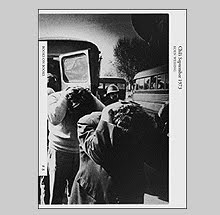The Books of Fouad Elkoury

Exactly one year ago, I was in Paris scouring the shelves of all of the Mona Lisait bookstores looking for photo and art books that never make it to the States. Three of the more interesting titles I found were by the photographer Fouad Elkoury. Although I wasn’t familiar with his work I did remember his name from Beirut City Centre (Editions du Sycomore 1992) among Gabriele Basilico, René Burri, Raymond Depardon, Robert Frank and Josef Koudelka. He has six books of his photographic work and one book of writing on photography all of which are from French publishers.
The first I found was called Palestine l’envers du miroir published by Hazan in 1996. Since the text is in French (in all of the books), I have only had the pictures to enjoy. This title is described on his website as: “A photographic and textual road diary documenting life in Palestinian cities. The work was carried out just after the Oslo agreements, when hope towards a solution of the Arab-Israeli conflict was prevailing.” You clearly get a sense of this being a personal road trip and personal observations from tone of the photographs. Using various formats he describes the streets, refuge camps and the landscape that he guides us through. The text is a series of diary entries that I guess (not being able to read French) speak in some way to the politics of the region.
In Liban Provisoire (Hazan 1998) he drops us off in Lebanon where life plays out before us in normal routine. We are then thrust into the siege 1982. Beirut is cut off and shelled by the Israeli Defense Forces.
Elkoury sends us wandering through the devastated city. Nothing in the landscape seems untouched by gunfire and shells. The buildings left standing seem to defy gravity and are so pockmarked, it is seems impossible that anything could have lived through the fighting. Slowly we see people starting again to go about their business. Businesses reemerge. Someone with a perverse sense of humor opens an amusement center called “Snipers.” In the end, Elkoury gives us a way out of the rubble with a little hope. The last pictures show people laughing among the ruins.
The vantage point is not as a “camera seeing” but the distinct vantage point of human sight. Elkoury’s camera is a shell shocked witness twisting and turning to take it all in.
Sombres (Marval 2002) seems the most experimental of the three books. There is no text until a brief monologue at the end (in French of course) so there is no guide through text like in Palestine l'envers du mirior. Here he is creating a photographic road trip of disjointed images paired and sequenced to create implied poetry. References to September 11th and cancer (his?) are in the mix. He creates grids, pairings, triptychs that lead us through a landscape full of memory and present concern.
All three of the books are nicely produced with an individual feel to their content and form.











